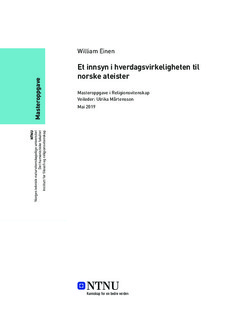| dc.description.abstract | In this project we explore the Everyday Life of five Norwegians that identify themselves as atheists. Important research questions were to find how atheists define notions like atheism and religion and get broader insights into how the informants encounter greater society and religion. Finally, we set out to establish a deeper understanding of what an atheistic symbolic universe looks like and how it operates.
As a theoretical framework, we make use of the sociology grounded on phenomenology, as established by Alfred Schutz, and developed further by Peter Berger and Thomas Luckmann in The Social Construction of Reality. We make use of their central analytic term Everyday Life which entails the human subjective experience as our field of study. Further, we explore how knowledge in Everyday Life is created intersubjective and structured in relevance structures. Finally, we apply their theory of symbolic universes as an analytical tool, to formulate questions that map out the symbolic universes of the atheists. Our method is qualitative and we conducted qualitative interviews with five self-identified atheists.
The main findings as to the research questions are as follows. Apparently, Norwegian atheists use science as a conceptual machinery to maintain and legitimize their atheistic symbolic universe. Everything from explaining alternative symbolic universes like the religious, to creating a cosmology and explaining evil, refers to and gets meaning through scientific explanations. For the informants, science is also the main reference that undermines religion and strips the religious worldview of its plausibility and meaning.
Furthermore, the findings show that the definitions of atheism by the informants are mixed. Three of the five are arguing for a broader definition than the narrower literal one defining atheism as lack of believing in God. When explaining both their own atheism and the religiosity of others, the main reference is socialization, you are first and foremost born into religion or secularity.
Finally, the informants encounter with religion in their daily life are first and foremost related to institutional rituals like baptism and funerals. Their approach is focusing on the non-religious aspect of the ritual, like welcoming or bid farewell to a family member, and defining these rituals as tradition rather than religion. The findings suggest that Norwegian atheist experience rather low levels of social stigma or discrimination. In fact, when questioned, two out of the five informants, pointed out that they felt there is more stigma related to identifying yourself as religious in Norway. | |
